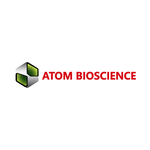�ABP-671 effective at lowering serum uric acid,�the cause of gout
JIANGSU, China--(BUSINESS WIRE)--Atom Bioscience, a clinical stage biotechnology company developing new treatments for inflammatory and metabolic diseases, announced today that it will present final dated data from its Phase 2a clinical trial of its small molecule URAT1 inhibitor for treatment of chronic gout at the American College of Rheumatology (ACR) annual meeting, Convergence 22, in Philadelphia, PA, Nov. 10-14.
The final data is in the abstract entitled, �A Double-Blind, Placebo-Controlled, Ascending Dose Phase 2a Study of ABP-671, a Novel, Potent and Selective URAT1 Inhibitor, in Patients with Gout or Hyperuricemia,� which will be presented by Marc Gurwith, M.D., J.D., Atom�s Chief Medical Officer. Dr. Gurwith�s Ignite Talk is scheduled for Sunday, Nov. 13 at 10 am U.S. Eastern Time. A virtual poster presentation will be in Poster Session D on Monday, Nov. 14, from 1 pm. to 3 pm U.S. Eastern Time
Atom previously reported that its investigational new drug ABP-671 achieved the clinical trial�s primary endpoint of reducing serum uric acid (sUA) levels to less than 6 mg/dL, which is below the clinically defined threshold of 7 mg/dL for hyperuricemia, the cause of gout. The drug was also well tolerated.
In this Phase 2a trial, conducted in Australia, 60 patients were randomized to one of three treatment groups receiving a 2 mg, 4 mg or 8 mg daily dose of ABP-671 or placebo; and the treatment groups were subdivided into cohorts receiving their dose once daily, or split into twice daily dosing.. At time of enrollment, mean sUA levels of all patients in the trial were greater than 8 mg/dL. Mean sUA levels for all three APB-671 dose groups met the primary endpoint of less than 6 mg/dL. Additionally, higher doses of ABP-671 reduced sUA levels by greater amounts.
The final data demonstrates the breadth of sUA reductions observed in the clinical trial. At the end of the 4-week dose evaluation period, mean sUA levels ranged from 3.1 to 5.3 for the six different ABP-671 dose cohorts compared to 9.1 mg/dL for the combined placebo cohorts. All study participants who received ABP-671 daily, irrespective of dose frequency (once or twice per day), met the primary efficacy endpoint, and this was significantly greater than patients who received placebo. Mean reductions in sUA levels from baseline to the end of the 4-week dose evaluation period were -36%, -51%, -59% for the 2 mg, 4 mg, and 8 mg groups compared to increases of 7%, 1% and 13% in the placebo groups (all p < 0.0001). ABP-671 was well tolerated, with the overall incidence of treatment emergent adverse events similar between the ABP-671 treatment cohorts and the placebo cohorts.
�These study results show that doses of only 2 to 8 mg per day of ABP-671 reduce uric acid levels considerably, whether APB-671 is given once or twice per day. This is a major step forward for the control of chronic gout,� said Atom CEO, Chairman, and Founder Dr. William Shi. �ABP-671 is a novel, patented, orally-available molecule developed in our labs which has the potential to become a better treatment than currently available medications. Next year we plan to initiate a much larger clinical trial as we continue on our path to seek FDA approval.�
Gout is one of the most common types of inflammatory arthritis affecting more than 55 million people worldwide. The disease has a large and growing patient population in the U.S., Europe, Asia and Latin America. Gout is caused by hyperuricemia, a high concentration of uric acid in the blood (greater than 7 mg/dL). The excess uric acid levels lead to formation of urate crystals in and around the joints and other soft tissues, triggering sudden flaring of inflammation and unleashing excruciating pain.
"The efficacy and safety data from Atom Bioscience's clinical trial are impressive," said Dr. N. Lawrence Edwards, MD, Professor of Medicine, Division of Rheumatology and Vice Chairman of the Department of Medicine at the University of Florida in Gainesville. "There is a definite need for more effective therapies for gout, the genetic cause of which has for too long been misunderstood. Atom's data is very encouraging, and I look forward to future positive results."
Gout commonly presents other serious health problems and is associated with a number of comorbidities including cardiovascular disease, obesity, diabetes and kidney disease.
�Gout is a growing disease with considerable unmet need for new therapeutics. We are hopeful that this Atom compound will continue to demonstrate efficacy and good safety in future studies and ultimately be available to gout patients suffering with flares due to hyperuricemia,� said Dr. Kenneth Saag, M.D. M.Sc., Professor of Medicine, in the Division of Clinical Immunology and Rheumatology, University of Alabama, Birmingham.
ABP-671 is a novel small molecule inhibitor of the urate transporter (URAT1) protein, which is involved in the reabsorption of uric acid by the kidneys. In gout patients, ABP-671 reduces the reabsorption of uric acid, increasing its excretion in urine to prevent gout attacks.
About Atom Bioscience
Jiangsu Atom Bioscience and Pharmaceutical Co., Ltd., is a fast-growing innovative drug company focused on development of best in class small molecule therapeutics for treatment of inflammatory and metabolic diseases. The company�s lead product, ABP-671, is in late stage clinical development for treatment of chronic gout. For more information please visit: https://atombp.us/.
Contacts
Media Contact:
Dan Eramian
Opus Biotech Communications
425-306-8716
Business Development Contact:
Roy J. Wu,
SVP Business Development
Email: roy.wu@atombp.com










